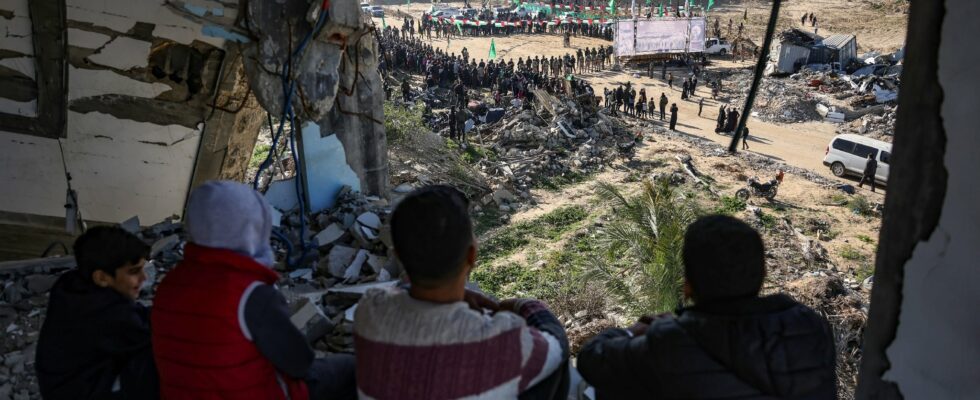A Côte d’Azur from the Middle East or hell on earth? Since the entry into force of the ceasefire in the Gaza Strip, on January 19, the fate of the 2.1 million Palestinians who populate this Palestinian enclave has agitated the whole world. Everyone puts forward their plan, from the extreme proposals of Donald Trump to the jets of saws of the Arab countries. But no one, or almost, is interested in the opinion of the first concerned: the Gazaouis.
Obviously, collecting this opinion resembles an impossible mission, since the Gaza Strip remains closed to international journalists and its inhabitants live in absolute precariousness, in the middle of a territory destroyed at more than 70 % per fifteen months of war. But in early January, before the ceasefire, the University of Oxford managed to conduct, with Arts International and the Palestinian PSR survey institute, an unprecedented study on the state of mind of Gazaouis.
In the middle of the ruins, the researchers surveyed a representative sample of 500 Gazaouis, for an exercise rich in lessons. “External observers might think that after so many tests, the Gazaouis would be ready to accept compromises on political issues in order to have access to their most urgent human needs, write the authors of the study In Foreign Affairs. Our survey tells a more complex story. “
Unpopular Hamas
Three points emerge from this unprecedented study. One: Hamas no longer embodies the future. After a leap in post-October 7 popularity, where he was seen as the only organization capable of “resisting” Israel, the terrorist group is only supported by 20 % of Gazaouis. In charge of the Gaza Strip since 2007, Hamas has been partly held responsible for the violence of the Israeli response since October 7, while its military capacities have been reduced to the minimum. “Hamas is very, very weak, said a diplomat in the region recently. It is no longer the paramilitary organization that she may have been in the past, it is no longer able to threaten Israel as before.”
Despite this weakness of Hamas, the other Palestinian political organizations have not gained popularity: only 18 % of respondents say they support the leader Marwan Barghouti, imprisoned in Israel for terrorism since 2002, and only 13 % defend the organization of Liberation of Palestine. In reality, one in three Gazaoui says he feels represented by any of the current political options, which illustrates the dead end in which the Gaza Strip is located. “Even very weak, Hamas works quickly to fill this leadership vacuum in Gaza,” alert the study authors.
National sovereignty before security
Second lesson: the Palestinians reject any movement of their territory. “In majority, respondents say that national sovereignty is much more important than the security and well-being of their family,” said the authors of the study, who compare this feeling to the one who animated both those who were fighting For and against Daesh in Iraq in 2015-2016. “The Gazaouis believe that abandoning their lands, as Trump suggested, would like to stop being Palestinian, continue the researchers. Without Israeli concessions on these Palestinian Cardinal Values or American will to respect them, our survey suggests that Gazaouis will continue to fight. “
By presenting his Gazaouis moving plan, Donald Trump assures that he keeps their well-being in mind and that such a transfer of population would allow them to “live in safe, war” places “. An illusion that the Palestinians reject massively. “This solution advocated by Trump actually poses multiple problems,” says Andrew Fox, a former British high ranking and specialist in the Middle East at the Henry Jackson Society. The main thing is to move over 1.5 million people without They are volunteers … Then how to persuade neighboring countries to welcome them, such as Jordan which had a civil war with the Palestinians in 1970 or Egypt which refuses to open its borders since the start of the conflict? “
What future for relations with Israel?
Third teaching: hatred prevails. Before October 7, a majority of Gazaouis said he was in favor of a two -state solution, Israel on one side and Palestine on the other. At the time, 20 % advocated the destruction of the Hebrew state. Today, there are only 48 % more to prefer the two -states solution, when 47 % of those surveyed opted for a pure and simple disappearance of Israel, the only way to lead to lasting peace … 5 % of Gazaouis judge a third credible alternative: the creation of a binational state with equal rights for Arabs and Jews.
In any event, the atrocities of October 7 and the destruction of the Gaza Strip will have damaged for a long time any hope of solid peace.
.
